| Telecom Australia - Miscellaneous Anritsu Test/Demonstration/Sample Cards | |
|
The Australian Anritsu Silver 5000 unit Test Card, and the Australian Anritsu Corporation Green 200 Unit Demonstration Card, shown below, were printed by Toppan Printing and magnetically encoded by Anritsu in Japan. They were provided around 1987 / 1988 by Anritsu Corporation to Telecom for the use of the Chief and Senior Telecom Engineers in familiarizing themselves with, and obtaining experiencing in, the operation and performance of the Anritsu phone system and technology. These cards were not used by Telecom Payphone Technicians for the field testing of Telecom Payphones. These Cards had a units remaining scale on both their top and bottom edges and therefore did not need an arrow on the face of them to indicate the correct edge to be inserted into the phone, because either edge of the cards could be inserted into the phone, with the remaining units after a phone call being shown on one of the two scales on these cards. However, this novelty did not progress onto any other Australian Anritsu cards which subsequently had an green arrow to indicate the end of the card to be inserted into a Telecom Payphone. The Anritsu Corporation Bronze Sample Card, shown below, is recorded officially as being both an Egyptian, and South African card, and confirmed for those countries. It is not an Australian card, even though it had previously been listed as one on the Colnect Website. |
|
| Front Of Miscellaneous Anritsu Card | Back Of Miscellaneous Anritsu Card |
|
|
|
| Australian Anritsu Silver 5000 Unit Test Card | |
|
|
|
| Australian Anritsu Corporation Green 200 Unit Demonstration Card | |
|
|
|
| Anritsu Corporation Bronze Sample Card | |
|
Telecom Australia - Anritsu Corporation First Type Test Cards |
|
| The Australian Anritsu
First Type Test Cards used were the basic un-encoded Anritsu
Corporation Sample Card supplied by Anritsu Corporation in
Japan, as shown below. These cards were subsequently encoded by
Telecom Engineers in Australia, with various different $ Values
which were often hand written, with a black permanent marker, on
the face of the phonecards. They were used by Telecom Engineers
from 1987 to 1988 to learn and to obtain experience with
encoding Anritsu Phonecards and also for testing the operation
and performance of the payphones and the overall phone system
being developed for Australia. These Test Cards had a units
remaining scale ranging from 0 to 20 units, and rising by
increments of 2 units. When a $ Value was written on one of
these cards, it was typically within the range of $2 to $100,
and the $ Value on the card equated to 20 units. |
|
| Front Of Anritsu First Type Test Card | Back Of Anritsu First Type Test Card |
|
|
|
|
Telecom Australia - Anritsu Corporation Second Type Test Cards |
|
|
In September 1989, Telecom Australia
signed an interim agreement, with Anritsu Corporation, and
Toppan Printing Company (both of Japan) and Alcatel STC
Australia, to work together and achieve a viable Payphone
system. Anritsu supplied the phonecard reader technology as well
as Anritsu Corporation test cards, and would encode the trial
phonecards, while Toppan printed the phonecards for the trials.
Alcatel would provide Telecom with the finished Phonecard
Payphones. |
|
|
Stamped
$ Value |
Serial Number Ranges |
Quantity |
||
|
First Batch |
Second Batch |
Third Batch |
||
|
$1.5 |
00001 to 00200 |
01001 to 01200 |
02001 to 02300 |
700 |
|
$2.0 |
00201 to 00400 |
01201 to 01400 |
|
400 |
|
$3.0 |
00401 to 00600 |
01401 to 01600 |
|
400 |
|
$5.0 |
00601 to 00700 |
01601 to 01700 |
|
200 |
|
$6.0 |
00701 to 00800 |
01701 to 01800 |
|
200 |
|
$10.0 |
00801 to 00900 |
01801 to 01900 |
|
200 |
|
$20.0 |
00901 to 01000 |
01901 to 02000 |
|
200 |
|
No $ Value |
|
|
|
700 |
|
NOTE: A $1.50 phonecard in 1990 could make a maximum of 5 x 30 cent phone calls which would produce a maxi-hole used phonecards with holes punched at the 0%, 20%, 40%, 60% and 80% positions on the % remaining scale of the card. However several used $1.50 stamped Anritsu Second Type Test Cards have been sighted with one or more holes punched in them at the 10%, 30%, 50% 70% and/or 90% positions on the card which would indicate that at least some of these cards were actually encoded with a $ Value higher than $1.50. |
|
| Front Of Anritsu Second Type Test Card | Back Of Anritsu Second Type Test Card |
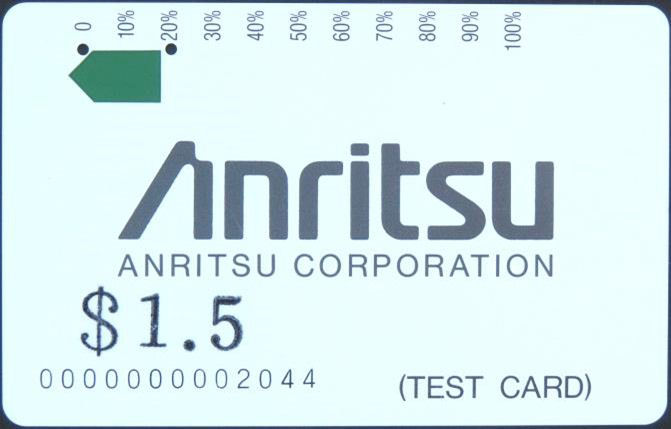 |
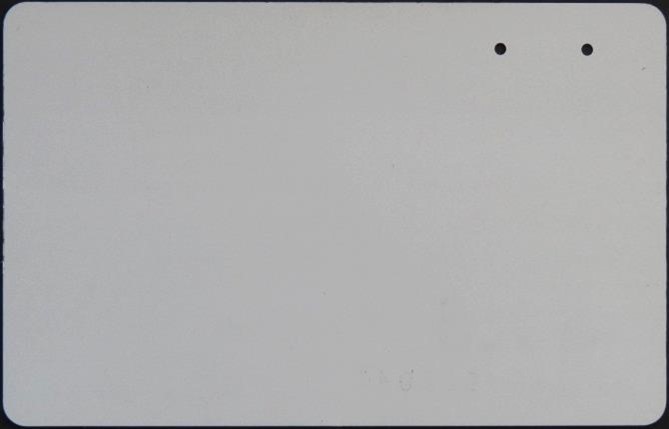 |
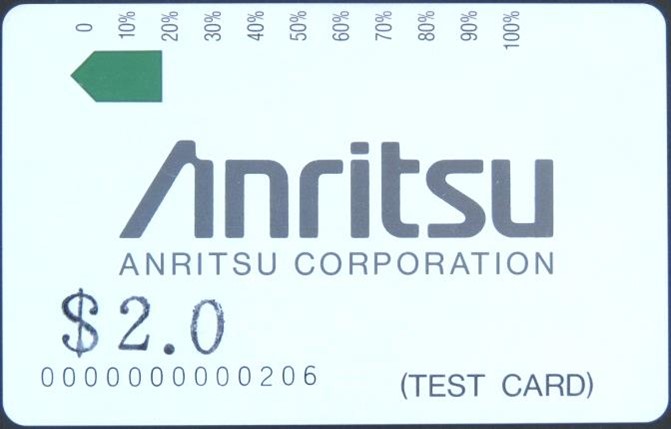 |
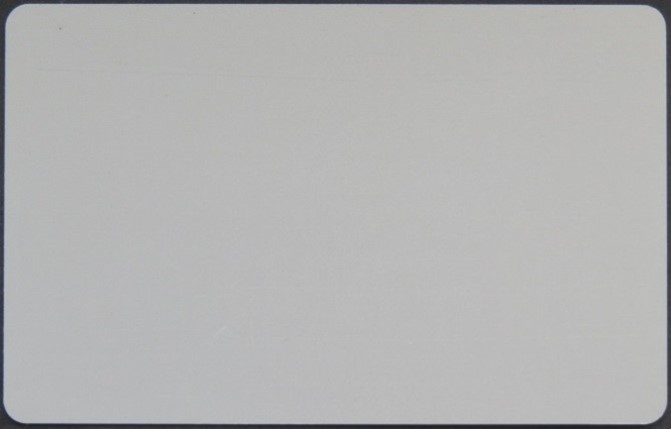 |
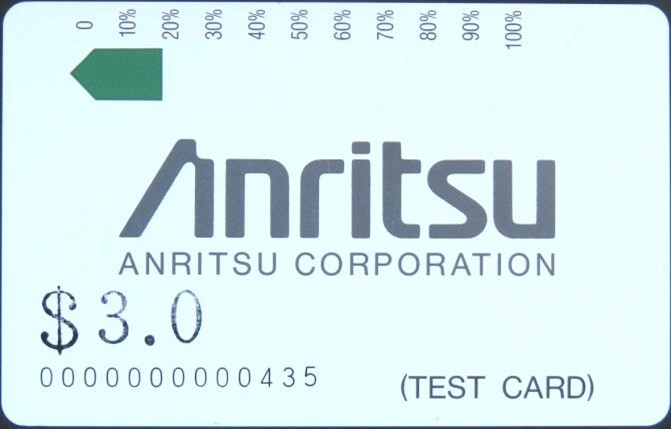 |
 |
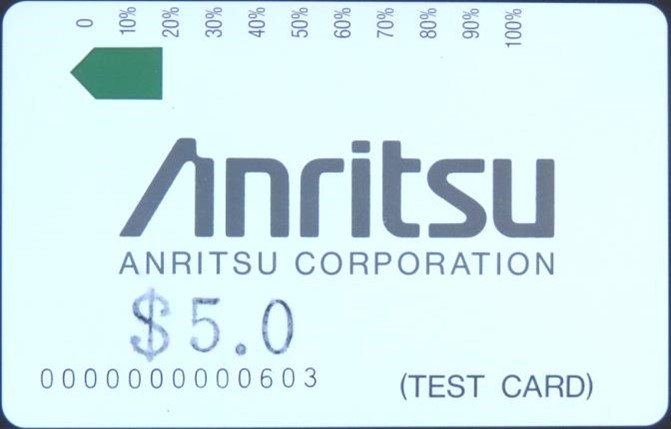 |
 |
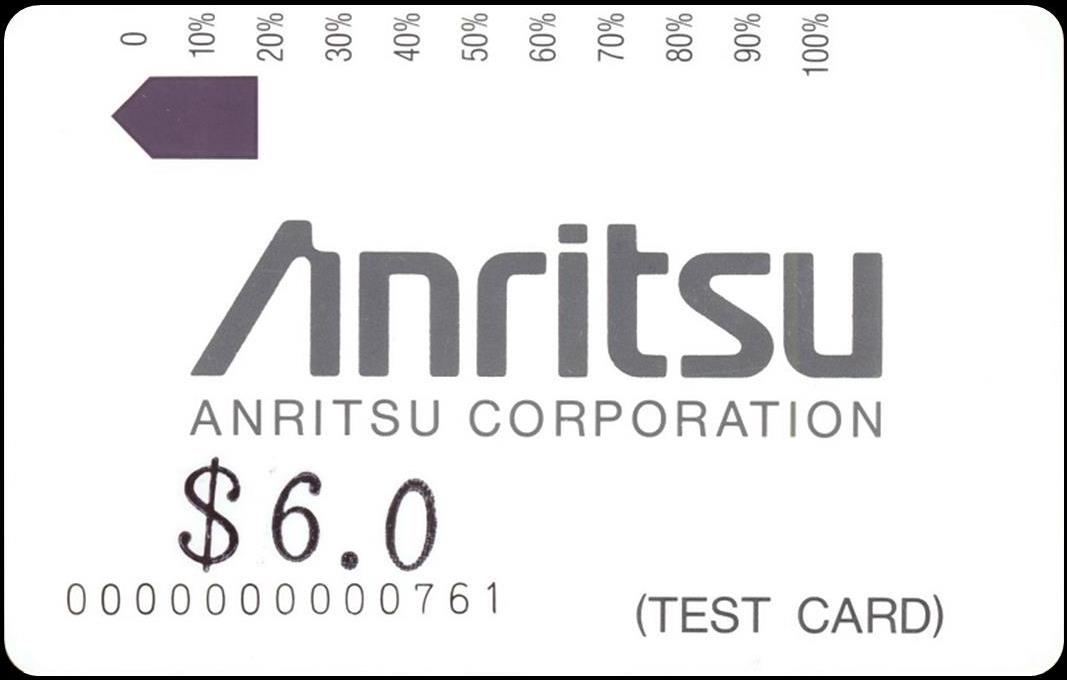 |
 |
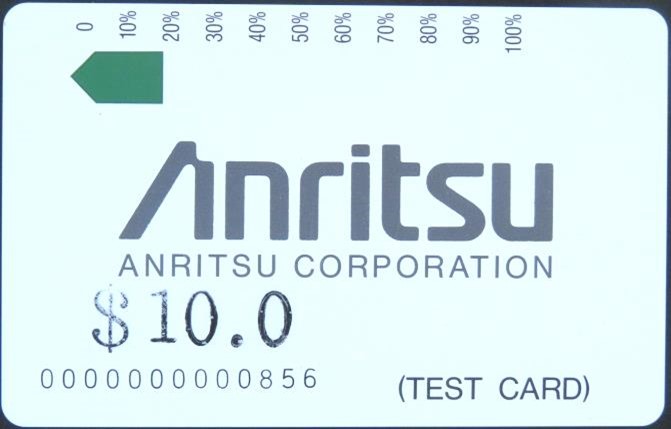 |
 |
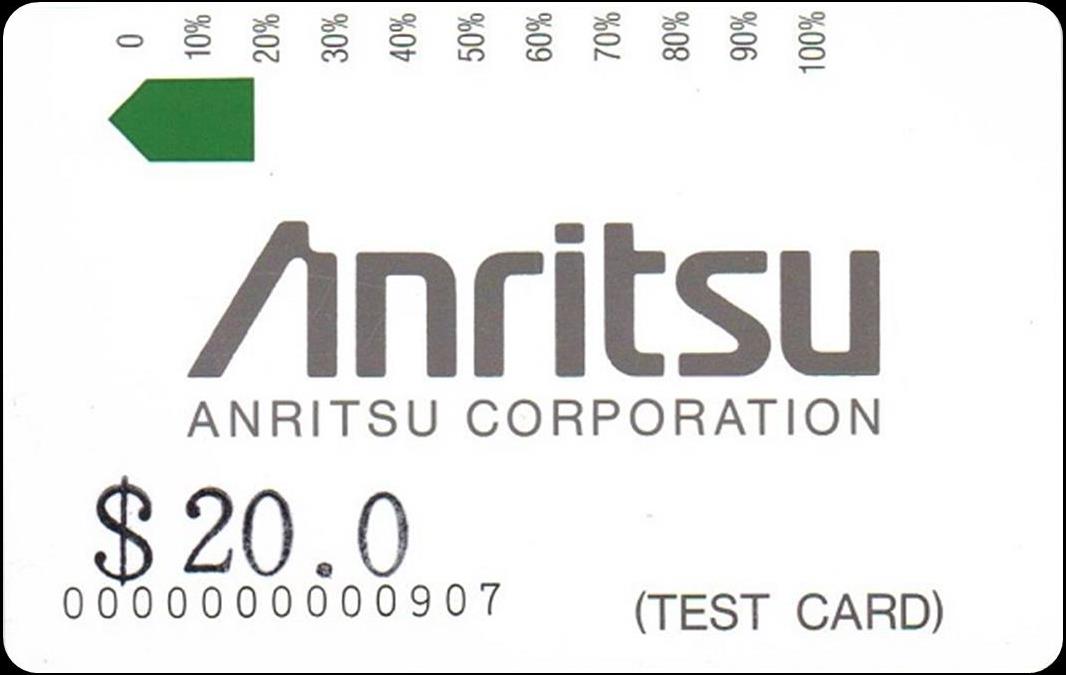 |
 |
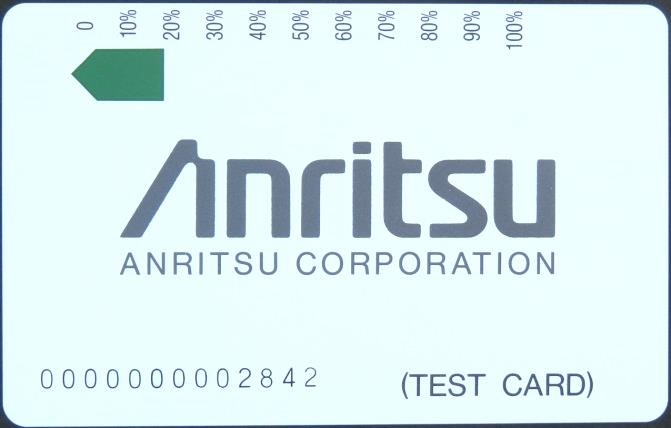 |
 |
|
Telecom Australia - Anritsu Corporation Third Type Test Cards |
|
|
Telecomís experience with its Anritsu
Second Type Cards indicated that it was: |
|
| Front Of Anritsu Third Type Test Card | Back Of Anritsu Third Type Test Card |
|
|
|
|
|
|
|
|
|
|
|
|
|
|
|
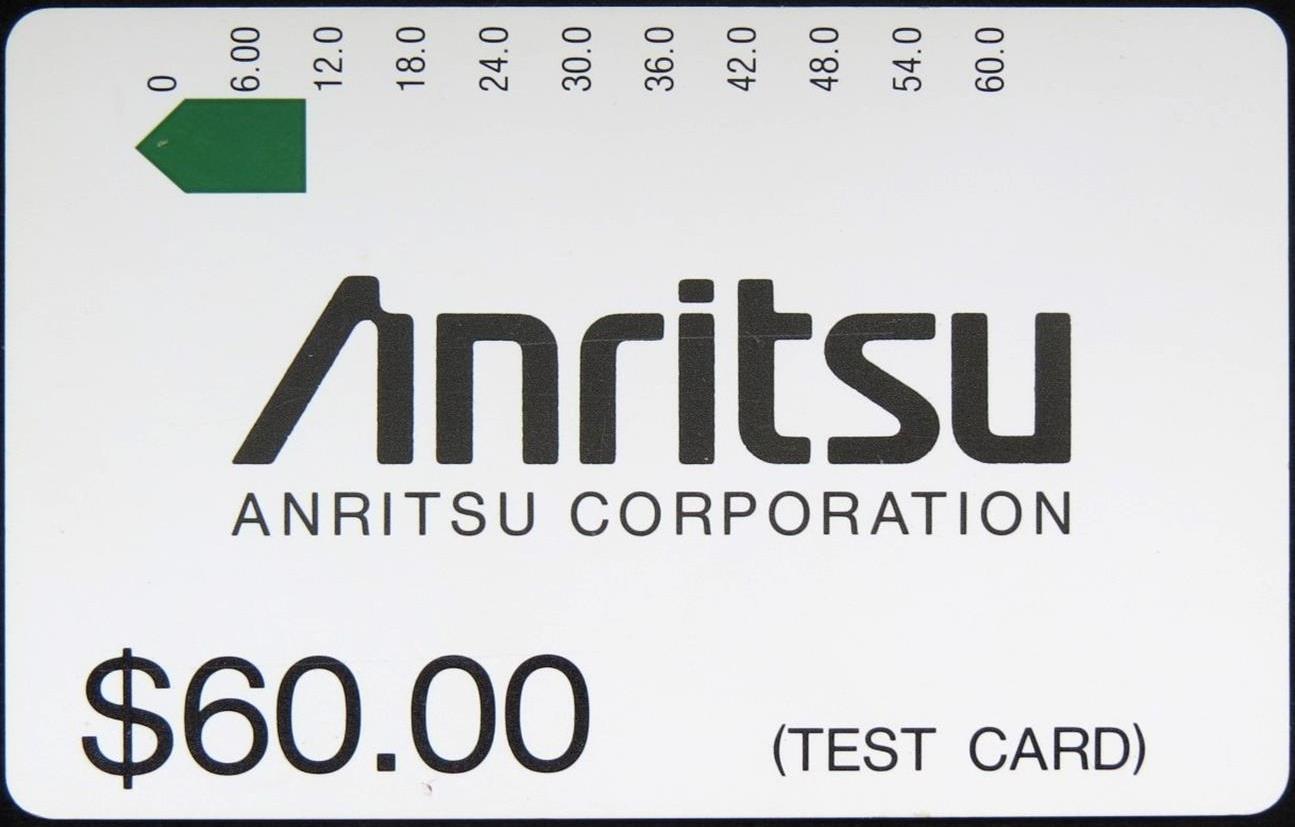 |
|
|
|
|
|
These were the last official Magnetic Anritsu Test Cards and 5,000 of them were produced in Australia by Placard towards the end of 1996. They are believed to be the Prefix 1316 Telstra Phonecards. These Test Cards did not have the $ Value of the Card printed on their fronts, but were encoded by Telstra with a value of $1.50, and had a value remaining scale ranging from 0 to 100% rising by increments of 10%. They were produced for Telstra Payphone Technicians to use in the field for testing, servicing and maintaining Telstra Payphones. |
|
| Front Of Telstra Payphones Test Card | Back Of Telstra Payphones Test Card |
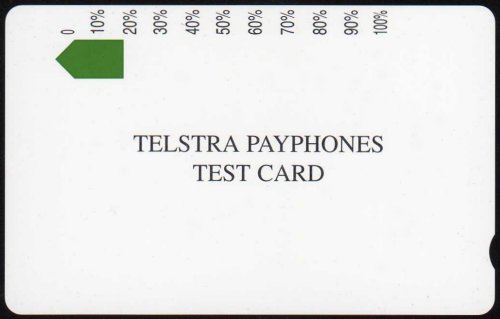 |
 |
| $1.50 Telstra Payphones Test Card - Prefix 1316 | |